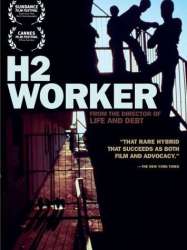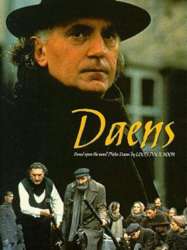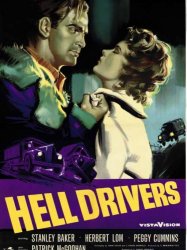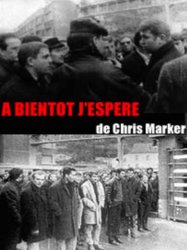Films with theme "Films about the labor movement", sorted by revenue

Final Offer (1985)
, 1h18Directed by Sturla Gunnarsson
Origin Canada
Genres Documentary
Themes Transport films, Films about the labor movement, Films about automobiles, Documentary films about business, Documentary films about historical events, Documentary films about politics, Documentary films about technology, Political films, Road movies

Thieves' Highway (1949)
, 1h34Directed by Jules Dassin
Origin USA
Genres Drama, Thriller, Noir, Crime
Themes Transport films, Films about the labor movement, Trucker films, Road movies, Children's films
Actors Richard Conte, Valentina Cortese, Lee J. Cobb, Barbara Lawrence, Jack Oakie, Millard Mitchell
A war-veteran-turned-truck driver Nico "Nick" Garcos (Richard Conte) arrives at home to find that his foreign-born father, a fruit farmer, has lost his legs and was forced to sell his truck. He learns that his father was crippled at the hands of an unscrupulous produce dealer in San Francisco, Mike Figlia (Lee J. Cobb). Garcos vows revenge.

Dr. Knock (1951)
, 1h38Directed by Guy Lefranc, Maurice Delbez
Origin France
Genres Comedy
Themes Medical-themed films, Théâtre, Films about the labor movement, Films based on plays
Actors Louis Jouvet, Louis de Funès, Jean Brochard, Pierre Renoir, Pierre Bertin, Marguerite Pierry
Voulant assurer le triomphe de la médecine qu'il fait passer avant l'intérêt des malades, et souhaitant devenir le maître des habitants du village et de ses environs, le docteur Knock arrive à Saint-Maurice pour succéder au docteur Parpalaid, brave honnête homme mais dont la clientèle est rare. L'état de santé du pays est excellent. Se rendant compte qu'il a été dupé par son prédécesseur, mais loin de se décourager, Knock fait comprendre à chaque patient qui se presse à ses consultations que tout bien portant est un malade qui s'ignore. Le résultat ne se fait pas attendre. Tout le village se retrouve au lit ; l'hôtel est transformé en clinique et même Parpalaid revenu temporairement, doit s'aliter, inquiet à son tour pour sa santé, à la suite du « diagnostic » du docteur Knock, ce dernier ayant réussi à le persuader qu'il était en mauvaise santé.

Salt of the Earth (1954)
, 1h34Directed by Herbert J. Biberman
Origin USA
Genres Drama, Historical
Themes Feminist films, Politique, Films about the labor movement, Political films
Actors Rosaura Revueltas, Will Geer, David Bauer, David Wolfe
The film opens with a narration from Esperanza Quintero (Rosaura Revueltas):

H-2 Worker (1990)
, 1h7Directed by Stéphanie Black
Origin USA
Genres Documentary
Themes Environmental films, Films about the labor movement, Documentary films about business, Documentary films about environmental issues, Documentary films about politics, Political films

Taxi Blues (1990)
, 1h50Directed by Pavel Lounguine
Origin Russie
Genres Drama, Comedy
Themes Transport films, Films about the labor movement, Films about automobiles
Actors Peter Mamonov, Elena Safonova
Shlykov, a hard-working taxi driver and Lyosha, a saxophonist, develop a bizarre love-hate relationship, and despite their prejudices, realize they aren't so different after all.

Priest Daens (1992)
, 2h18Directed by Stijn Coninx
Origin France
Genres Drama, Historical
Themes Films about religion, Films about the labor movement, La précarité
Actors Jan Decleir, Gérard Desarthe, Antje De Boeck, Johan Leysen, Linda van Dyck, Jappe Claes
Le film relate la vie de l'abbé Adolf Daens, un prêtre catholique flamand, désireux d'aider la classe ouvrière miséreuse des années 1880 à Alost dans leur lutte sociale contre Charles Woeste.

Rice People (1994)
, 2h5Directed by Rithy Panh
Genres Drama
Themes Films about the labor movement
In Cambodia, where families were torn apart in the communist Khmer Rouge's genocidal bid to transform the country into an agrarian utopia, it is ironic that people have lost touch with the land. For a generation of children, the rice comes not from the ground, but from a sack, offloaded from the back of a United Nations relief truck.

Hell Drivers (1957)
, 1h48Directed by Cy Endfield
Origin United-kingdom
Genres Drama, Thriller, Action, Noir, Crime
Themes Transport films, Films about the labor movement, Trucker films, Road movies
Actors Stanley Baker, Herbert Lom, Peggy Cummins, Patrick McGoohan, David McCallum, Sean Connery
Tom Yately, just released from prison, is determined to start a new life and he gets a job as a driver at Hawletts, a haulage company that transports loads of ballast gravel from a nearby quarry. The truck-drivers are offered bonuses by the agent Cartley for delivering their loads at dangerously high speeds along narrow roads. Tom is accepted by the other drivers except Red, the foreman and head driver and also a violent bully. Tom soon becomes friends with Gino, an Italian driver who is in love with Cartley's secretary Lucy. Red offers a cash bonus to any driver who can make more runs than him and Tom is determined to try.

God's Little Acre (1958)
, 1h58Directed by Anthony Mann
Origin USA
Genres Drama, Comedy, Romance
Themes Films about the labor movement
Actors Robert Ryan, Aldo Ray, Jack Lord, Tina Louise, Buddy Hackett, Fay Spain
Widower Ty Ty Walden (Robert Ryan) and his two daughters live in the backwoods of Georgia during the Great Depression (although the film appears to be set in the 1950s, since many of the cars are 1950s vintage). While Ty Ty searches for gold on his farm, his son-in-law Will (Aldo Ray) cheats on his wife Rosamund (Helen Westcott) with Griselda (Tina Louise). Ty Ty has been digging for gold on his land for 15 years. Pluto Swint (Buddy Hackett) arrives to announce he's running for sheriff. Swint is invited to come around back where Darlin' Jill (Fay Spain) is taking a bath in an outdoor bathtub positioned near a handpump and spigot. She asks him to pump some more water (the camera never dips lower than the top of the tub). He is asked to keep his eyes closed, but takes a pleasurable peek.

Pitfall (1962)
, 1h37Directed by Hiroshi Teshigahara
Origin Japon
Genres Drama, Science fiction, Fantastic, Fantasy, Crime
Themes Films about the labor movement, Political films
Actors Hisashi Igawa, Kunie Tanaka, Kei Satō
Pitfall is set against the background of labour relations in the Japanese mining industry, but the film owes as much to surrealism as it does to "socially aware" drama. The mine in the film is divided into two pits, the old one and the new one, each represented by a different trade union faction. A mysterious man in white, whose identity we never learn, murders an unemployed miner who bears an uncanny resemblance to the union leader at the old pit and bribes the only witness to frame the union leader of the new pit. The two union leaders go to the murder scene to investigate only to come across the body of the witness, who has subsequently been killed by the man in white. They blame one another and begin a fight which ends in both their deaths. The film ends with the man in white observing them before riding off on his motorcycle, satisfied his mission is complete. Beyond this realistic plot, Pitfall shows us the realm of the dead as well as the living, as the ghosts of the victims look on, powerless to intervene in events and bring the truth to light.

Taxi (1996)
, 1h50Directed by Carlos Saura
Origin Espagne
Genres Drama, Crime, Romance
Themes Transport films, Films about the labor movement, Films about automobiles, Road movies
Actors Ingrid Rubio, Ágata Lys, Maite Blasco, Pilar Castro
After failing one of her midterm exams in a Madrid high school, Paz Velasco decides to drop out of the academic circuit. She takes this prompt decision much to the chagrin of her father, an overbearing taxi driver. In exchange, he forces her to join him at work so she can learn the trade and earn a living.

A Man for Burning (1964)
, 1h32Directed by Frères Taviani, Valentino Orsini
Origin Italie
Genres Drama
Themes Mafia films, Seafaring films, Transport films, Films about the labor movement, Political films, Gangster films
Actors Gian Maria Volonté, Didi Perego, Spiros Focás, Turi Ferro, Marina Malfatti, Marcella Rovena
Après deux années passées sur le continent, Salvatore retourne dans sa Sicile natale. Alors qu'il rêve d'être accueilli en fils prodigue, il constate que les habitants de son village l'attendent, plutôt impatiemment, afin d'y dénouer un conflit d'ordre social. La question cruciale est celle-ci : faut-il occuper les domaines que la récente loi a expropriés et partagés et que la Mafia empêche qu'on leur distribue ? Les paysans entament une action pacifique, mais Salvatore veut aller plus loin : en labourant et semant, ils doivent provoquer une situation irréversible. Les paysans se mettent au travail, mais la Mafia les attaque à l'aube. Les carabiniers interviennent alors pour empêcher les combats. Ne s'avouant pas vaincue, la Mafia entreprend de contrôler l'affermage des carrières du voisinage. Simultanément, elle cherche à gagner à sa cause Salvatore, en l'achetant si nécessaire. Bien qu'il feigne d'accepter la négociation, Salvatore engage une campagne pour améliorer les conditions de travail dans les carrières. Un matin, Salvatore s'en prend violemment au chef local de la Mafia : celle-ci le liquide physiquement, une heure après. Le village entier, lui rendant hommage, assiste à ses funérailles.

The Firemen's Ball (1967)
, 1h11Directed by Miloš Forman
Origin Tchecoslovaquie
Genres Drama, Comedy
Themes Films about the labor movement, Disaster films
The volunteer fire department in a small Czechoslovak town decides to organize a ball in a townhall with raffle and a beauty pageant. The firefighters also plan to present a small ceremonial fire axe as the birthday gift to their retired chairman who has cancer (although they believe he may not know of it).

Be Seeing You (1968)
, 43minutesDirected by Chris Marker
Origin France
Genres Documentary
Themes Films about the labor movement, Documentary films about politics, Documentaire sur le monde du travail, Political films
Le film relate la grève dans l'usine de textiles Rhodiacéta de Besançon, en mars 1967, au travers des témoignages des ouvriers sur leurs conditions de travail et motivations. Cette grève a pris un aspect particulier de par l'assimilation du plan culturel du plan social : les revendications ne tournent plus seulement autour de l'entreprise (salaires ou sécurité de l’emploi), mais aussi sur le mode de vie que la société imposait notamment à la classe ouvrière. Les ouvriers grévistes qui occupent l'usine ont à leur disposition du matériel pour filmer les événements, grâce à Chris Marker, Jean-Luc Godard ainsi que Bruno Muel. Comme le Mai rampant italien, cette grève est une sorte d'avant-coureur de la vague de fond de mai 68.
 Connection
Connection